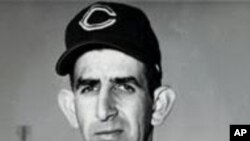Nicknames are short and clever substitutes for real names. But, in North American Major League baseball, they can also be connections to a player’s skill, personality, quirks or distinctive features.
Baseball has a history unlike any other major American sport. It is a history going back to the 19th century. Back then, you had such nicknames as "Dummy" Hoy, a deaf mute who played outfield for 14 seasons starting in 1888.
There was Robert “Death to Flying Things” Ferguson, a reference to his ability to catch flyballs as an outstanding infielder.
Also of note was Michael “King” Kelly, an outfielder, catcher and manager who spent most of his 16-year career with the Chicago White Stockings and Boston Beaneaters. Kelly was “King” for his success as a run producer.
More familiar nicknames are known from the 20th century. Maybe not so well known but illustrative is Hughie “Ee-Yah” Jennings, so named in recognition of his whoops, whistles and gyrations as manager of the Detroit Tigers during the early 1900’s.
Of course, who could top the “Sultan of Swat,” Babe Ruth, the great New York Yankees home run hitter.
Honus “The Flying Dutchman” Wagner was one of the greatest shortstops of all-time, plying his trade with the Pittsburgh Pirates.
Some years later, you had “Old Aches and Pains” Luke Appling, the star shortstop for the Chicago White Sox.
The Washington Senators had Walter “Big Train” Johnson, the strikeout artist with an overpowering fastball and one of the best pitchers to ever wear a uniform.
Who can forget Lou Gehrig, the “Iron Horse,” for his incredible durability with the New York Yankees, before he was struck down tragically by a fatal disease that bears his name.
Or, Joe DiMaggio, the New York Yankees outfielder extraordinaire; so good, in fact, he was called “Joltin” Joe DiMaggio and “The Yankee Clipper.”
His fierce rival was Boston Red Sox star Ted Williams, also so good he was called “Teddy Ballgame” and the “Splendid Splinter.”
Bob Feller, the Hall of Fame Cleveland Indians pitcher was called “Rapid Robert” for his blazing fastball.
Stan “The Man” Musial, who played for 22 years with the St. Louis Cardinals, knocked out 3,630 hits.
The “Say Hey Kid” Willie Mays is considered by many to be the greatest all-around player in baseball history for his hitting, running and fielding. The nickname comes from calling out his then unknown teammates when he first joined the New York Giants.
There’s Mickey Mantle, the “Commerce Comet” referring to his home town in Oklahoma, a long way from where he turned into one of the game’s most feared home run sluggers with the New York Yankees.
'Hammerin' Hank Aaron belted 755 home runs, the first player to break Babe Ruth's magical record of 714.
Now what of those players not so well known? What of their monikers so dear to the devoted fans?
How about Marv Throneberry, a first baseman with the New York Mets in the early 1960’s. He was of limited talent and was called “Marvelous Marv” because he wasn’t.
Then there was another first baseman, Dick Stuart of the Pittsburgh Pirates, better known as “Dr. Strangeglove” for his poor defensive skills.
Boston Red Sox Pitcher Bill Lee flourished as “Spaceman,” so named for his counterculture behavior and occasional antics on and off the field.
Mike Hargrove was known as the “Human Rain Delay” for his peculiar habit of tugging and pulling at his uniform every time he came to bat.
Pitcher Don Mossi was a funny-looking player known as “Ears,” but good-natured about it.
Freddie Patek was called “The Flea," a good little shortstop, but one of the smallest at five-feet five.
'Eye Chart' belonged to Doug Mientkiewicz. Not hard to see what that means.
One to ponder is Jeffrey Leonard or “ Penitentiary Face” owing to his grim expression.
Shakespeare, not known for his ball playing skills, but who could turn a phrase rather than a double play, perhaps said it best. “What’s in a name? That which we call a rose by any other name would smell as sweet.” The players come and go, but their nicknames are a measure of sweet remembrance. Just ask “Sweet” Lou Johnson.




